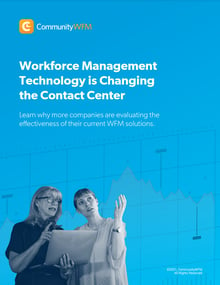
Great schedules are a cornerstone of any contact center. Building a schedule and getting it right the first time reduces the amount of last minute adjustments and helps to improve agent morale. However, consistently building an excellent schedule can be a challenge even for the best WFM analysts.
To increase the likelihood of creating schedules that work for everyone, more contact centers are turning to a schedule bidding processes. This involves every agent bidding on a set schedule over a specified period (a week, a month, etc.) and is designed to get agents invested in the scheduling process instead of being told when and where to work.
Here’s a quick outline of how agent schedule bidding works in a modern contact center so your team can better understand what a successful process looks like.
Step 1: Determine schedule types and frequencies – A contact center can go in many different directions here. For example, you can break shifts up by time of day (morning, afternoon, evening) or channel. Another strategy is to combine a lighter contact volume day, such as Friday, with your heaviest volume day to incentivize working busier shifts. There are many options and sitting down to figure out the right one for your contact center is a critical first step.
Step 2: Utilize technology for bidding – Trying to track agent bids through email or spreadsheet can get chaotic quickly. Instead, leverage schedule bidding technology built for contact centers to streamline the process. A bidding platform built into a workforce management (WFM) software solution is ideal and directly ties into several steps below.
Step 3: Forecast and create different schedule options – This step is a lot easier if your team has the same solution for both forecasting and schedule bidding. The forecast can be created and, if the software is the same, different schedule options can be built quickly based on the information provided.
Step 4: Create any agent bid groups – Some contact centers prefer to provide a select group of agents with the opportunity to bid ahead of the larger agent pool. This privilege can be based on tenure or even as a nice perk for your highest performing agents. These groups can be customized and leveraged to improve agent performance and retention.
Step 5: Open the bidding up to agents – If using groups, you can start with a short window for these select agents to bid first. After the groups have finished, all remaining agents can start placing their bids. A software solution with the option for agents to bid on multiple schedules at once can be helpful.
Step 6: Implement multiple bid rounds (if needed) – Depending on your process, some agents may not be able to get a bid accepted right away. When this occurs, your team can implement multiple bid rounds until all agents have a schedule for the period. A bidding solution that displays the chances of winning a bid for a specific schedule directly to the agent can help reduce the need for multiple bid rounds.
Step 7: Close bidding and create the schedule – Once all bidding has been completed, it’s time to make the actual contact center schedule. Opting to utilize a leading WFM software solution for every step can turn this process into just a few clicks. Best of all, with this technology, every agent involved in bidding will be alerted immediately through mobile and desktop notifications when the schedule has been officially created. Agents will know right away what shifts they are working so they can plan their lives around their schedule.
Hopefully this outline on how the schedule bidding process works in a modern contact center was helpful. The thing to remember is while the concept of schedule bidding is promising – a schedule made by agents to meet their unique needs – it requires the right technology and preparation. When properly executed, it can truly become a successful way to consistently create great schedules in your contact center.








